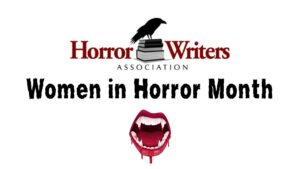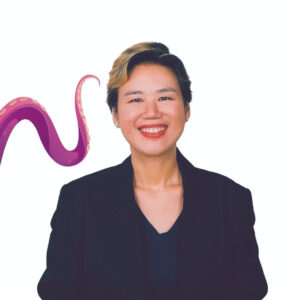Women In Horror Month 2024 : An Interview with Yvette Tan

What inspired you to start writing?
I started writing the same way a lot of authors do: I couldn’t find stories that I wanted to read, so I had to write them myself. I grew up in a Chinese Filipino Evangelical Christian household and went to a Catholic all-girls school, which means I grew up more repressed than your average lady. I was made fun of for liking to read (a cousin actually laughed at me for spending my summers reading, for example) for wanting to write, and especially for wanting to write horror. It wasn’t an easy journey, but it was also fun. I actually didn’t know I was writing horror. I had an interest in the paranormal so I wrote what I wanted to write. A friend had to physically take me aside and explain that what I was writing was horror. When my first story was published in a national newspaper, my mom, a devout Christian, told everyone about it without knowing what I had written. Some church people actually read it and complained to my mom that it gave them nightmares. She was horrified that her eldest daughter would shame her in that way, to the point that on the day of the launch of my first book, she said, “Why can’t you write Christian books?” Those were the only words she spoke to me that day. She’s proud of me now, sure, but only because everyone else is proud of me and not because she thinks I did anything noteworthy.
I wrote because I was constantly lonely and all those feelings needed to go somewhere. I wrote because I was always afraid. I wrote because I was constantly in survival mode and writing was the only time I ever really felt like myself. Someone said I write about scary things as a way of coming to terms with the things that scare me and I think that might be as good an explanation as any, but I also think I write horror because I like how the language flows in the books I read.
I really thought I was the only person interested in the things I wrote. I didn’t expect other people to take an interest in it as well.
What was it about the horror genre that drew you to it?
I’m often asked this question and I honestly don’t know the answer because I will be the first to tell you that I am easily frightened. That said, I’ve always been interested in the supernatural. Despite growing up in an Evangelical Christian household, I also grew up around Filipino folk beliefs, so much so that they flowed seamlessly into our daily lives. This has influenced the way I write, where supernatural happenings are treated as fact, but are no less scary. This is considered folk horror in the West but I’ve recently come across the term folk realism, which is a better way to explain my work from a Southeast Asian point of view.
I think another big reason I’m drawn to horror is the language used in horror fiction. I resonate with the words a lot. How something is written influences whether I will like a book or not and I tend to like the way horror books are written.
Do you make a conscious effort to include female characters and themes in your writing and if so, what do you want to portray?
No, I don’t, but this is also because I like writing undesirable protagonists, and they tend to be male. 😛 I do write female protagonists, though. It’s really about what a story needs.
What has writing horror taught you about the world and yourself?
Continuing to write horror despite the ridicule and lack of support I received, in the beginning, has made me realize that there are people out there who share my hurts and my dreams, That there are people who like my work and support it. That there’s a whole tribe of lost, lovable freaks that are more family than anyone biologically related will ever be. The internet has been a godsend because it’s made it easier to connect with other horror writers and enthusiasts. You learn about new works faster and you never feel that you’re alone.
How have you seen the horror genre change over the years? And how do you think it will continue to evolve?
I love that there are such diverse voices in horror now. What used to be dominated by old white men is now a space occupied by folks of different races and genders, each bringing their own worldview to the table. It’s a more dynamic playing field, though it still has a long way to go. I’m glad that there are so many diverse voices because it means more books to read!
How do you feel women have been represented thus far in the genre and what hopes do you have for representation in the genre going forward?
I’m glad that women have more agency in the genre and aren’t used as set pieces for men’s stories to move forward like they were written a lot of the time before. Honestly, that’s how I thought proper fiction should be written because that’s all I read. I’m glad that it’s not the case! I like that audiences are clamoring for realistically written female characters and how there’s a retroactive backlash on shoddily written female characters. There’s still a long way to go in terms of equality, but I’m glad that there’s a push to get there.
Who are some of your favorite female characters in horror?
I like Meche Vega in Sylvia Moreno-Garcia’s Signal to Noise and the tooth fairy in Grahan Joyce’s The Tooth Fairy. Meche is complex and The Tooth Fairy is written in a way that paints her as bordering on evil, but both actions are understandable, if not relatable, and I love the language of both books.
Who are some women who write horror you recommend our audience check out?
The author who made me realize that I wanted to write horror was Billy Martin when he was still writing as Poppy Z. Brite. I didn’t read horror but a friend in college thrust a copy of Wormwood into my hands and I haven’t been the same since. The prose of their work captivated me in a way that no author ever has. It was so lush and beautiful, that I felt that my body wasn’t big enough to contain the emotions reading it made me feel. I wanted to capture that feeling for myself, and to this day, that’s the kind of emotion I aim for when I write. I don’t claim to write as well as they do, but I know I’m on the right track when I feel the way I felt when I first read Brite’s stories thirty years ago.
What is one piece of advice you would give horror authors today?
Keep writing and submitting. You might get a lot of backlash because horror is so misunderstood, but there’s a community of horror authors and readers out there who are eager to read new works and offer support. The internet has made it easier to find your tribe. Use it to your advantage.
And to the women who write horror out there who are just getting started, what advice would you give them?
The world wants to hear and needs your voice. You have a unique point of view that is wholly your own, and every story you write and publish means someone somewhere is reading it and feeling things, whether it’s “this gives me joy” or “what a little freak,” but in any case, you’ve made them feel something, and that’s a big reason we read fiction, isn’t it? To feel something. To remind ourselves that we’re human. Keep writing, because each story is a reminder that we are human.
 Bio:
Bio:
Yvette Tan is one of the Philippines’ most celebrated horror writers. Aside from short fiction collections in English and Tagalog, she’s written a feature film that received nationwide release and co-written a libretto for a ballet that was performed by Ballet Philippines on the main stage of the Cultural Center of the Philippines. She was the official scribe of the Manila Biennale in 2018 and her story was the companion piece to the artwork that adorned the Philippine pavilion in the 2021 Frankfurt Book Fair. She co-hosted “Trese After Dark,” the behind-the-scenes companion to the Netflix hit anime “Trese.” She was a creative consultant for a Filipino game inspired by the country’s mythical creatures and the collection Seek Ye Whore and Other Stories was nominated for the 41st National Book Awards. Her works have been translated into Spanish, Czech, and Hungarian. Read more about her at yvettetan.com.



